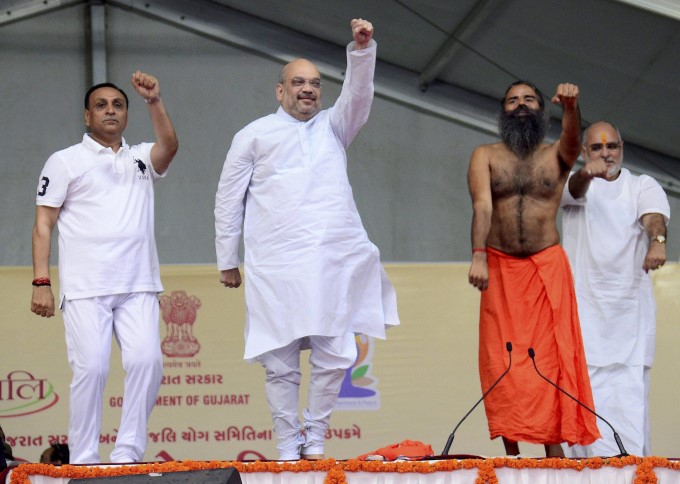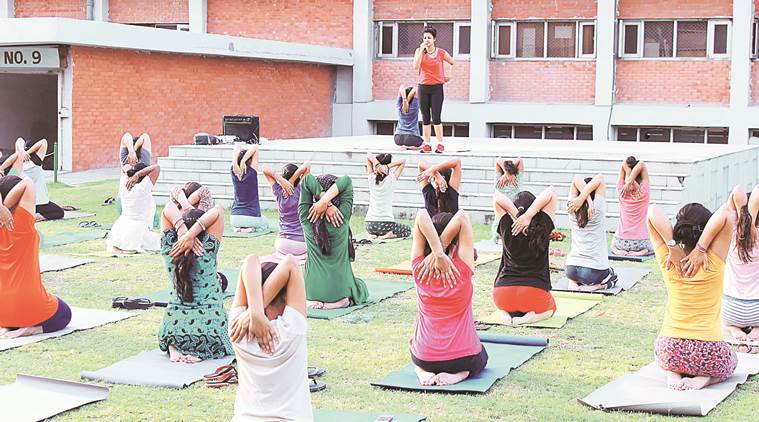
Yoga was seen practicing by almost everybody on the International Yoga Day. The body language of many of them unequivocally expressed the fact that they don’t practice it daily. I have never practiced Yoga and I don’t intend to practice it ever. It may be or it must be good for the body. But, what the present day India direly needs is not fitness of the body but the mind. We are all having body fitness more or less. But mentally the collective conscience of the nation seems to be sick—sick with unnecessary prejudices in the name of caste and religion. If your ‘religious feelings’ are ‘hurt’ by the sight of people skinning dead cows or eating beef and you flog the skinners publicly and lynch the eaters, what is the use of your practicing Yoga daily? If you practice Yoga without practicing the simple virtue, Live and Let Live, would it have any positive use for you as the citizen of a great syncretic nation and for the nation as a whole? Would it help us have national integration or social unrest? Would it help us have communal harmony or communal tension?
What the nation needs today is not Yoga, but tolerance; not aggressive and exclusive nationalism that hurts the nation as a whole, but inclusive mindset that helps the nation to fight the enemies within, to fight those business forces that devastate Environment which sustains us. Those whom we have to flog publicly are not the hapless people who skin dead cows for a pittance to eke out a living, but those who devastate our forests and rivers and accumulate wealth, in the name of development; those who deprive us of fresh air to breathe, fresh water to drink and a sustainable Environment to live in, all in the name of development.
What the nation needs today is highlighting the spirit of love, tolerance and mutual respect which are found in abundance in the narratives of the fifties, sixties and seventies and have been systematically pushed to oblivion since the eighties, especially after 1991, when India was given to the market forces.
And we have to remember that only the people who belonged to two political parties and one organisation did the work of fifth column or treachery during the historic Quit India revolt. The political parties are the Muslim League and the Communist Party and the organisation is none other than RSS that now teaches us nationalism and patriotism! When the nation needed patriotic people to fight the British, these people were helping the British either by supporting them or remaining neutral. They never fought the British who were drinking the lifeblood of the motherland and now they call themselves true nationalists and patriots and chant Bharat Mata ki jai!!
Flogging the hapless or lynching the poor is not patriotism. It is treason. Let me show you what patriotism really is. There is a touching incident of real patriotism narrated in the autobiography of Khwaja Ahmad Abbas—I am not an Island: An Experiment in Autobiography. I am quoting it in detail:
“The two-day session of the AICC on 7 and 8 August 1942 is a part of history. I was among the reporters that the Chronicle commissioned to cover it…..after the resolution was passed, Mahatma Gandhi spoke. I found him in a different mood on that day. There was a new timbre in his voice as he said, “I want freedom immediately, this very night, before dawn, if it can be had….” And again when he said, “Here is a mantra, a short one, that I give you. You may imprint it on your hearts. The mantra is ‘Do or Die.’ We shall either free India or die in the attempt.”
At midnight on August 8, 1942, all the Congress Working Committee Members were arrested for passing the Quit India resolution. In the evening of August 9, a spontaneous protest rally was gathered at Shivaji Park in Bombay. Abbas continues:
“Men and women in white were entering the park from all sides, and the policemen in blue and their white uniformed officers were trying to stop them. In all this excitement I got separated from Sathe and Jog and joined a crowd of young men who had got a flag and were raising slogans and singing Jhande Ooncha Rahe Hamara. My feeble voice joined their mighty roar, but in that moment there was no feeble voice, there was no personal identity; all voices, all identities were merged in the people, in the identity of national purpose.
We were stopped by a contingent of police who attacked us, first blinding us with tear gas bombs, then raining canes and lathis on our heads and chests and backs. I also got hit with a blow on my head but in the moment I felt neither pain nor the blood oozing out of the injury.
Coughing, groping blindly, almost stepping over the victims of the lathi charge and tear gas attack, I came out of the park when two delicate and wrinkled hands held me, supported me and guided me.
“Come this way, son,” said a woman’s voice in Marathi.
She guided me over the stairs of a house and took me into a room, made me lie down on a bed. The head injury was cleaned with cotton wool and iodine which made me wince. Then she applied a wet cloth to my eyes, after a few moments the smarting seized. Now I could open my eyes but saw darkly, as if through a glass. When the focus of my eyes was restored to normal, I saw the oleographs of Bhagwan Krishna, Lakshmi Devi, and Shivaji on the walls. In a corner reserved for Puja, there was the idol of some god where an oil lamp flickered. The old woman was praying—perhaps for me.
In those days, religion was surrounded by all kinds of taboos and I was afraid I had been mistaken for a caste Hindu. I got up with a start.
The old woman came to me and said in Marathi, “Why have you got up, son. Rest here for a while.”
I didn’t speak Marathi, but I could understand a little of what she said. So I said, “ No maaji. Now I am all right. It is night. I must go now.”
“No, son. First you take some hot milk.”
She got the steaming milk from the kitchen in a brass cup, and I was so moved by her humanity that I hesitated to take it. I was afraid of defiling her religion.
“Maaji, I am a Muslim.”
This, I thought,was conclusive information which would induce her to have second thoughts about entertaining the unknown stranger.
“So, what of it?” she said simply, and gave the cup in my hand. I drank the milk in one gulp, and said, giving back the cup to her, “Forgive mother, I interrupted your puja.”
She said simply, “This is also puja, my son.” (Chapter 23, Life Amidst Death)
Braving the British canes and lathis for the freedom of motherland is what is called patriotism. The kind and tolerant act of the ‘delicate and wrinkled’ old Maaji is what is called patriotism. The healthy mind of this old Maaji is what India direly needs today, not Yoga and the stupid nationalism and patriotism that instigate antisocial elements to flog and lynch people.
Sukumaran C. V. is a former JNU student and his articles on gender, communalism and environmental degradation are published in several publications. Email: [email protected]










































